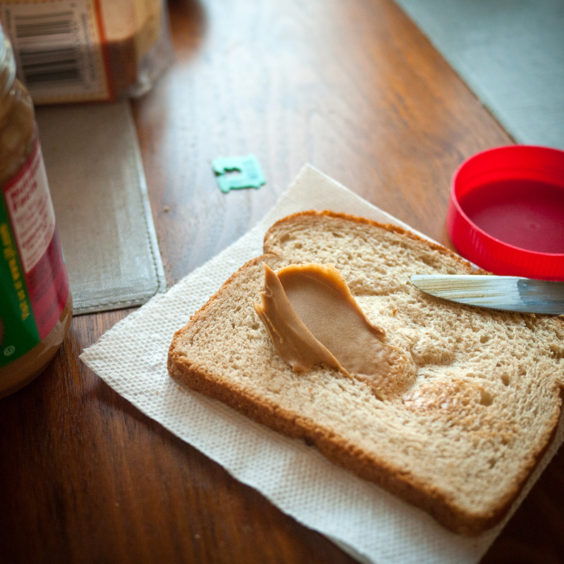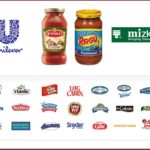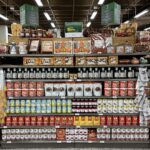If the price of peanut butter lately has you cutting back on your kids’ PB&J sandwiches, there’s some good news – better prices, promotions and coupons could be coming our way in the coming year. You can credit a perfect storm, of sorts, involving the economy, agriculture and new corporate players in the peanut butter business.
Peanut butter is a $2 billion-a-year industry in the United States, with nearly three-quarters of households having some in their home at any given time. That’s despite the fact that prices have gone way up in recent years, at a time when cash-strapped customers can least afford it.
Could Hormel come to the rescue? Earlier this month, the maker of Spam announced it was buying the Skippy peanut butter brand from Unilever for $700 million. Among coupon users, Unilever is known for being a little stingy and restrictive with its coupons lately. Not content with the more common “four like coupons” restriction, Unilever coupons include the wording: “Maximum of TWO identical coupons allowed in same shopping trip.” Plus, coupons for Skippy in particular have been hard to come by. There was exactly one insert coupon last year (a “$1 off 2”, since expired, in November 11th’s RedPlum), and one printable for “$.50 off 2” that was offered on Unilever’s website.
Hormel generally has been more generous with its coupon offerings. It currently hosts two different printable coupon sites (at Hormel.com/Coupons and Hormel.com/Gatherings). A Hormel spokesman told Coupons in the News that the company “will be considering a variety of marketing options” for Skippy, but that it was too early to get into details about any specific plans for promotions and coupons. But it does have big plans for the brand. “We’re going to find ways to take the product out of the jar and make the Skippy name useable on other types of products,” Hormel CEO Jeffrey Ettinger said when the Skippy sale was announced. So it could be a safe bet that Hormel will want to highlight its newest acquisition, and related spinoff products, with new promotions and coupons.
Aside from that speculation, there’s real reason to believe that peanut butter prices will be better this year. The higher prices were largely due to a bad harvest, and the resulting high cost of peanuts, in 2011. That forced nearly everyone – not just Skippy – to raise their peanut butter prices, and cut back on promotions. Prices jumped by more than 50% in early 2012, and while they’ve eased off a bit, the most recently available data from the U.S. Bureau of Labor Statistics show that peanut butter prices in November 2012 were still 29% higher than they were the previous year.
But Smuckers, the maker of number-one peanut butter brand Jif, says relief is on the way. “At some point, we will need to take a price decline of some sort,” company CEO Richard Smucker said in November, “and we would anticipate that being beneficial to the overall category.”
Also beneficial is the recent entrance of Kraft into the peanut butter business. It introduced Planters peanut butter a year and a half ago, and is still offering high value coupons like the “$1 off” coupon that appeared in yesterday’s SmartSource insert. And promotions like that do have an impact. An incredibly dense, but fascinating if you’re into that kind of thing, report from Judith Chevalier and Anil Kashyap of the National Bureau of Economic Research recently found that – surprise – peanut butter sells quite well when it’s not full price. In the markets they studied, 33% of all peanut butter is sold when it’s on sale, which it frequently is (so it makes you wonder why anyone pays full price at all). That led them to conclude that “an alert consumer who is not loyal to a particular brand and who is willing to store goods for a short period of time need almost never pay the ‘regular’ price.” But then we knew that, didn’t we?
One potentially worrisome development for peanut butter makers is what’s known as “The Peanut Butter Effect”. In a down economy, peanut butter sales tend to improve, as people switch to peanut butter from more expensive lunch meat. If the economy begins to improve considerably, peanut butter sales could decline just as prices start to go down. The last time there was a noticeable decline in peanut butter sales was during a salmonella scare in 2009. Peanut butter makers, including Smuckers and Peter Pan’s parent company ConAgra, responded by taking out full-page newspaper ads – complete with coupons.
Falling prices and lower demand may not be good for the peanut butter makers, but if it means more promotions and coupons – all the better for consumers.

















Yet, here we are September 2014 and PP prices have stayed at the same high price levels or have even gone up. Prices are approaching lunch meat numbers.
The latest numbers from the Bureau of Labor Statistics say peanut butter prices are down 4.7% from this time last year. Maybe not all of the peanut butter producers got the memo!